At the opening ceremony of the Pasteur Network Annual Meeting, on October 21, 2024 in Rio de Janeiro, Dr. Claire Sangba-Kembi-Ngounou, entomologist at the Institut Pasteur in Bangui (Central African Republic), receives the Talent Award. This distinction, funded since 2017 by Institut Pasteur, highlights young Pasteur Network researchers who have demonstrated scientific potential. For the first time, the award is in the Science & Communication category, recognizing researchers’ ability to disseminate their work to the general public.
A career in the service of public health
Claire Sangba-Kembi-Ngounou joined the medical entomology department at the Institut Pasteur in Bangui to begin her thesis in 2015. Today, she is a promising researcher in the field of entomology, having successfully secured funding from the Gates Foundation and the Wellcome Trust to support her innovative projects. She plays a key role in the fight against malaria by studying the behavior of mosquitoes, particularly the Anopheles species, major vectors of the disease. Her work focuses on analyzing the genetic diversity and adaptability of malaria vectors, with direct implications for disease control in the Central African Republic. By understanding the genetic basis of mosquito behavior and resistance, her research contributes to the development of more effective vector control strategies. This could reduce malaria transmission rates and improve public health outcomes. Her findings have been published in leading scientific journals such as the Proceedings of the National Academy of Sciences (PNAS).
A bridge between science and public action
In addition to her scientific activities, Dr. Sangba-Kembi is heavily involved in disseminating these results to all levels of society, earning her a dedicated article in the newspaper Le Monde, in the series “En Afrique, la science au féminin”. She has regular exchanges with the Ministry of Health of the Central African Republic on the development of policies to limit malaria transmission. She will use part of the funding from this prize to organize an awareness-raising campaign in schools on changes in mosquito-biting behavior and their implications for the fight against malaria.
Promoting scientific communication
This 8th edition of the Talent Award is the first to reward a scientist who not only demonstrates a strong scientific commitment, but also an outstanding ability to communicate his or her research to a wider audience. The award supports initiatives that promote clear and open communication, essential for building trust between science and society. In times of crisis, such as pandemics, effective scientific communication directly influences public behavior and safety.
“Encouraging scientific impact and communication”.
In congratulating Dr. Sangba-Kembi-Ngounou, Odette Tomescu Hatto, Vice President of International Affairs at Institut Pasteur, points out: “The Talent Award today celebrates a scientist who embodies not only scientific excellence, but also the ability to translate her research into concrete action, accessible to all. Dr. Claire Sangba-Kembi-Ngounou demonstrates that scientific communication is a powerful lever for shaping the future of public health.”
A total of twelve researchers have already received this award since its inception. The Talent Award 2024 marks a turning point in affirming that communication is an indispensable pillar for maximizing the impact of scientific research on society.
To find out more, replay of the opening ceremony : https://www.youtube.com/live/4nvcIrt6IlQ
About the PNAM2024 : https://pasteur-network.org/news/en/pasteur-network-annual-meeting-2024-will-take-place-in-rio-de-janeiro-brazil/
The Pasteur Network Annual Meeting 2024 (PNAM), co-organized with the Oswaldo Cruz Foundation (Fiocruz), is set to take place from October 21-23 in the vibrant city of Rio de Janeiro, Brazil. This prestigious event will convene leaders and experts from across the Pasteur Network and beyond, offering a platform to tackle today’s most pressing global health challenges. Participants will engage in a rich programme of presentations, workshops, and discussions aimed at fostering collaboration and driving scientific innovation. With a focus on key topics such as epidemic preparedness, climate-sensitive diseases, and equity in health research, the PNAM 2024 promises to be a catalyst for advancing public health solutions worldwide.
The meeting will address global health priorities, including climate change and its impact on infectious diseases like Dengue, epidemic preparedness for Mpox and Avian Influenza, as well as innovations in diagnostics, vaccine equity, therapeutics, gender and maternal health, and the role of AI in health research. These discussions align with the Pasteur Network’s strategic vision of reinforcing epidemic intelligence, promoting equitable collaborations, and fostering sustainable development in global health research.
Opening Ceremony
The opening ceremony will take place on Monday, October 21 at 6 PM (Rio de Janeiro UTC-3) and will be chaired by Mario Moreira, President of Fiocruz. It will feature remarks from key Brazilian officials, including Nisia Veronica Trindade Lima, Minister of Health of Brazil. Amadou Sall, President of the Pasteur Network & CEO of the Institut Pasteur de Dakar, Rebecca Grais, Executive Director of the Pasteur Network, and Yasmine Belkaid, Vice-President of the Pasteur Network and President of the Institut Pasteur, will also deliver opening remarks.
Keynote presentations will be given by global health leaders, including Peter Piot, Professor at The London School of Hygiene & Tropical Medicine and President of the PN Strategic Advisory Board, and Manoel Barral Netto from Fiocruz Bahia, who will share their insights on critical global health issues.
At 7:15 PM, the Talent Awards ceremony will take place, celebrating outstanding contributions within the Pasteur Network. This year, the award, funded by the Institut Pasteur, will honor a scientist who has demonstrated both scientific excellence and a strong commitment to sharing the work with the wider public through communication and engagement initiatives.
Follow the Live Streaming
The opening ceremony will be available to stream live on YouTube:
Engagement and Strategic Discussions
Throughout the event, participants will take part in a series of roundtables and parallel sessions focusing on the Pasteur Network’s strategic priorities: (1) strengthening epidemic preparedness with a focus on climate-sensitive health issues; (2) advancing research and innovation in diagnostics, vaccines, and treatments; (3) building knowledge-sharing communities; and (4) promoting equitable and sustainable collaborations.
The meeting will also provide a platform for scientists from across the Network to present their research, furthering the professional development objective of the PNAM.
For more details about the event :
About the Pasteur Network
The Pasteur Network is an alliance of over 30 institutes which plays a crucial role in tackling global health challenges through science, innovation and public health. Its distinctive strength lies in the diversity and extensive geographic reach, spanning 25 countries across 5 continents, fostering a dynamic community of knowledge and expertise.
The Pasteur Network is recognized as a WHO non-state actor, and members of the network are frequently embedded into local Ministries of Health. The PN sustains a global infrastructure encompassing 50+ national and regional reference laboratories, which includes multiple Biosafety Level 3 Laboratories, and 17 WHO Collaborating Centers.
For more information, consult the 2023 Pasteur Network report
Press contact: Juliette Hardy / news-pn@pasteur.fr
About Fiocruz
Fiocruz is the largest biomedical research institution in Latin America, also producing vaccines and medications to supply the Unified Health System (SUS). Linked to the Ministry of Health, it was established on May 25, 1900, to initially manufacture serums and vaccines against bubonic plague. Since then, the institution has undergone an intense trajectory that is intertwined with the development of public health in Brazil. Today, Fiocruz operates in 10 states, as well as the Federal District, and has an office in Maputo, the capital of Mozambique, in Africa. In addition to its institutes based in Rio de Janeiro, it maintains units in the Northeast, North, Southeast, and South regions of Brazil. In total, there are 16 technical-scientific units focused on education, research, innovation, assistance, technological development, and outreach in the health sector. For more information, visit https://portal.fiocruz.br/en.
Press contact: Fiocruz / ccs@fiocruz.br
Teaching and training are an essential part of the work of the Pasteur Network’s members. The Network’s international courses respond to research and public health priorities at the global and regional levels, providing top-level training to scientists at different stages of their scientific careers, and strengthening scientific relationships between scientists within the Network and with other institutions.
Applications are now open for the Pasteur Network members
Since 2012, the Pasteur Network has offered over a hundred theoretical and hands-on courses worldwide as part of its mission. The international courses and training workshops serve three primary objectives:
- Address global and regional research and public health priorities.
- Offer high-quality training to scientists at different stages of their scientific career.
- Strengthen scientific relationships between scientists within the Pasteur Network and with other institutions.
Aligned with the Pasteur Network’s mission, the courses and training workshops are open to post-graduate students and young scientists from the Network and any other research institutions (universities, public health agencies, governmental organisations, etc.) from the host country and national institutions.
Submission of proposals, deadline: 15th of November 2024
Applicants are requested to submit their course online on Flexigrant.
Follow this link: https://calls.pasteur-network.org/startapplication.aspx?id=13738
Evaluation by the selection panel, deadline: December 2024
The proposals will be reviewed by an internal panel of experts.
Communication of results: December 2024
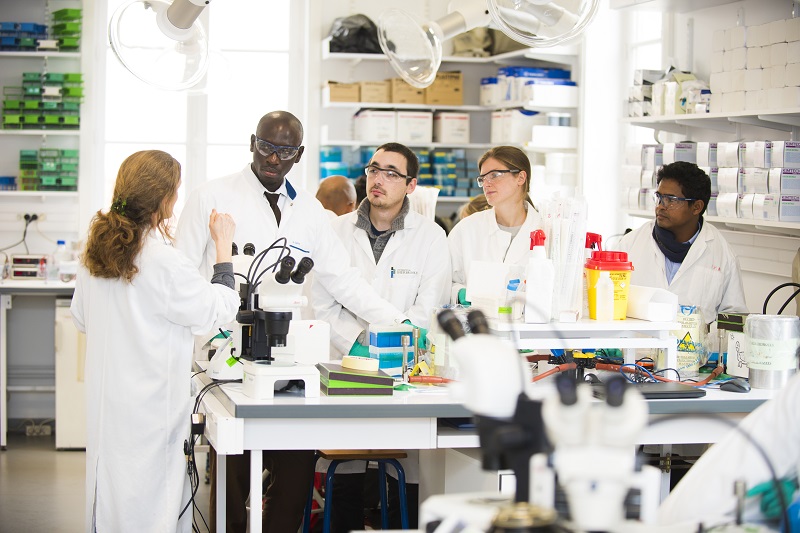
Selection criteria
To be considered for selection, courses must meet the following criteria:
- Quality: The course must be well-organized and cover relevant and high-quality topics. The team of teachers/instructors should be experienced and knowledgeable in the subject matter. A clear Monitoring and Evaluation plan should be outlined and Learning objectives listed.
- Relevance: Only courses that fall within the priority strategic axes of the Pasteur Network will be considered. These axes include reinforcing i) epidemic intelligence and preparedness and Climate and Health , ii) research, development and innovation in critical diagnostics, vaccines and therapeutics, iii) creating multi-disciplinary knowledge communities, and iv) promoting equitable collaboration. All scientific subjects are eligible within the strategic axes although priority is given to those listed in the Pasteur Network scientific strategy.
- Preference for network institutes: Priority will be given to courses conducted within and by a member institute of the Pasteur Network.
- Partner institutions: Priority will be given to courses associating with partner institutions.
- Involvement of local trainers/speakers: Local trainers/speakers must be involved in the course.
- Target audience: The course should be aimed at scientists, engineers, and senior technicians. Priority will be given to candidates from the Pasteur Network (at least 50%) and external candidates, all of whom are selected based on their merits.
- Innovative education tools: The use of innovative education tools is strongly encouraged and will be viewed positively during the selection process. Online or other digital tools can be used to enhance the course experience (virtual augmented reality, gamification, Collaborative Learning Management Systems (LMS,), etc.)
- Timing: The course must be completed before December 20th, 2025
- Max. financial support: 50,000€
Funding criteria
- Funding for the course must be justified and in line with the format submitted.
- The Pasteur Network will provide a maximum of 80% of the total budget of the course. Applicants are encouraged to supplement their budget through external fundraising.
Payment of the funds
- 85% of the awarded funding will be sent by wire transfer to the organizing institute, after reception of the invoice, 3 to 4 months before the course.
- 15% will be transferred after reception of the course full report (see course report section).
Eligible expenses
Eligible expenses for funding are:
- Consumables
- Travel expenses
- Hotel costs
- Catering
- Communication fees
- Local transport cost
Non-eligible expenses
Non-eligible expenses for funding are:
- Overheads or indirect costs
- Payments to teachers/instructors and students (incl. per diem)
- Equipment
- Rental (of premises) in an Institute of the Network.
By “ineligible expenses” we mean that the cited items will not be considered as direct expenses on Pasteur Network funding. The in-kind participation of the receiving Institute may be valued as co-funding. Should the applicant have any questions or doubt about other direct costs, Pasteur Network should be contacted for clearance.
Courses report
A technical and financial report shall be sent one month after the end of the course. The transfer of the remaining 15% of the awarded funds by Pasteur Network is subject to the reception of the full report.
Reimbursement
In case the overall awarded funds by Pasteur Network have not been used; the remaining funds will have to be reimbursed to Pasteur Network.
Contact
Any questions can be addressed to Renaud Vatrinet at renaud.vatrinet@pasteur.fr
On Monday, June 17th, in Paris, the Pasteur Network and the International Vaccine Institute (IVI) signed a landmark Memorandum of Understanding (MoU) to bolster their collaboration in global health initiatives. This agreement marks a significant step towards addressing infectious diseases and improving public health worldwide.
The MoU outlines a comprehensive framework for cooperation between the two organizations, focusing on several critical areas:
- Vaccine R&D Ecosystem: Strengthening vaccine research and development, particularly in the global South. This includes regional manufacturing of vaccines and enhancing public health responses to epidemic and pandemic emergencies.
- Training and Education: Supporting joint training and educational activities to build capacity and expertise in vaccine research and development.
- Collaborative Projects: Actively pursuing funding opportunities and developing joint proposals for research and training programs.
Rebecca F. Grais, Executive Director of the Pasteur Network, highlighted the significance of this partnership: “By combining our strengths and resources, we aim to accelerate vaccine development and improve accessibility, particularly in underserved regions. This collaboration is a crucial step towards our shared vision of a healthier world.”
Jerome H. Kim, Director General of IVI, echoed this sentiment: ‘Signing this MoU with the Pasteur Network will empower us to leverage our collective expertise and amplify our efforts in combating infectious diseases worldwide. This collaboration will support IVI’s capabilities in vaccine research and development, enabling us to tackle health challenges more effectively. Together, we will generate synergies to drive innovation of life-saving vaccines for the populations who need them most.’
The partnership will be guided by a Steering Committee, ensuring regular reviews and progress on collaborative projects. Both parties have committed to clear communication, transparency, and adherence to policies on anti-fraud, corruption, equity, and sustainability.
This MoU represents a strategic alignment of resources and expertise, setting the stage for innovative solutions to global health challenges. Together, the Pasteur Network and IVI are poised to make a lasting impact on global health, particularly in regions that are most vulnerable to infectious diseases.
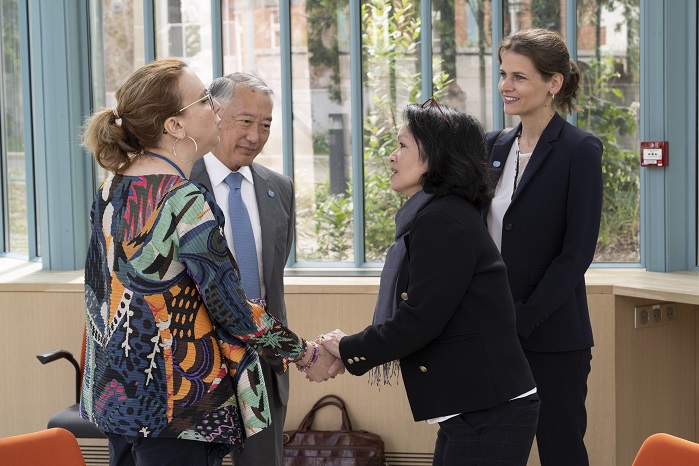
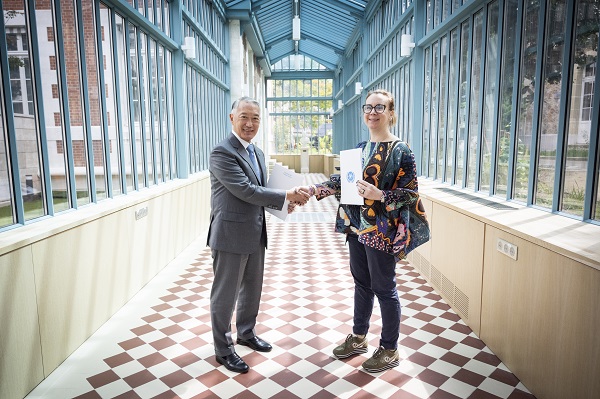
About the Pasteur Network:
The Pasteur Network is an alliance of over 30 institutes which plays a crucial role in tackling global health challenges through science, innovation and public health. Its distinctive strength lies in the diversity and extensive geographic reach, spanning 25 countries across 5 continents, fostering a dynamic community of knowledge and expertise.
The Pasteur Network is recognized as a WHO non-state actor, and members of the network are frequently embedded into local Ministries of Health. The PN sustains a global infrastructure encompassing 50+ national and regional reference laboratories, which includes multiple Biosafety Level 3 Laboratories, and 17 WHO Collaborating Centers.
The Pasteur Network’s work is guided by four strategic pillars: 1) Epidemic Preparedness, Intelligence, with focus on Climate sensitive diseases, 2) Research, Development, and Innovation, 3) Knowledge Communities, and 4) Good Governance and Equity.
About IVI:
The International Vaccine Institute (IVI) is a non-profit international organization established in 1997 at the initiative of the United Nations Development Program with a mission to discover, develop, and deliver safe, effective, and affordable vaccines for global health.
IVI’s current portfolio includes vaccines at all stages of pre-clinical and clinical development for infectious diseases that disproportionately affect low- and middle-income countries, such as cholera, typhoid, chikungunya, shigella, salmonella, schistosomiasis, hepatitis E, HPV, COVID-19, and more.
IVI developed the world’s first low-cost oral cholera vaccine, pre-qualified by the World Health Organization (WHO), and developed a new-generation typhoid conjugate vaccine that also achieved WHO prequalification in early 2024.
IVI is headquartered in Seoul, Republic of Korea, with a Europe Regional Office in Sweden, an Africa Regional Office in Rwanda, a Country Office in Austria, and a Country and Project Office in Kenya. IVI additionally co-founded the Hong Kong Jockey Club Global Health Institute in Hong Kong and hosts Collaborating Centers in Ghana, Ethiopia, and Madagascar. Forty one countries and the WHO are members of IVI, and the governments of the Republic of Korea, Sweden, India, Finland, and Thailand provide state funding.
Launch of a Climate-Health Observatory Accelerator program during the Pasteur Network Climate and Health Convening
(Dakar, June 4-5, 2024)
On June 4-5 in Dakar Senegal, 60+ participants, including members of the Pasteur Network and external experts met to discuss how the Pasteur Network can help address the growing impact of climate change on global health, fostering collaborative research and innovative solutions to mitigate emerging health threats and improve public health resilience
The event was supported by The Rockefeller Foundation and the HKJC Institute of Philanthropy who are funding the Pasteur Network’s new Climate-Health Observatory Accelerator program which aims to:
- Create foundations for C-H observatories through global network of Fellows.
This fellowship program is a unique opportunity designed for members in Low and Middle-Income Countries (LMICs) to empower researchers to provide support to local stakeholders in making informed decisions with regards to climate and health. - Advance generalizable tools and practices through Pasteur Network Exemplars
Exemplar members of the Pasteur Network will share their knowledge and expertise in climate and health and help to guide the fellowship cohort in their region - Scale impact through shared knowledge via Global Goods and an internal knowledge sharing platform. The 2-day event in Dakar focused on the Accelerator project in more detail, including break-out discussion sessions specifically on the fellowship program design and development of global goods.
Global experts also presented and facilitated discussion on various topics such as updates on the progress of the Pandemic Treaty (Dr. Maria de Lourdes Aguiar Oliveira from FioCruz), important trends and considerations for integrating climate aspects into health surveillance efforts (Dr. Linda Venczel from PATH), connecting climate-health recommendations with policy and investment decisions for government stakeholders (Mr. Jackson Kimani from Climate Action Platform for Africa-CAP-A), showcase of the WHO HIVE collaboration platform (Mr. Brian Yau from WHO), and a round table discussion on the development and dissemination of global goods (Dr. Cristina Tato from Chan Zuckerberg Biohub, Mr. Gaurav Godhwani from Civic Data Lab, and Dr. Felipe Colón-González from Wellcome Trust)
The convening was also an important celebration of Institut Pasteur de Dakar’s 100th anniversary, including a tour of the institute and a celebration cocktail. Celebrating IP Dakar’s 100th anniversary marks a century of pioneering research, innovation, and contributions to global health, reinforcing its vital role in combating infectious diseases and improving public health worldwide The Pasteur Network extends its heartfelt gratitude to the Rockefeller Foundation and the Institute of Philanthropy for their generous support, which made the meeting in Dakar on June 4-5th possible. We also wish to thank all the participants for their invaluable contributions and engagement, which were instrumental in advancing our discussions on the critical intersection of climate and health.
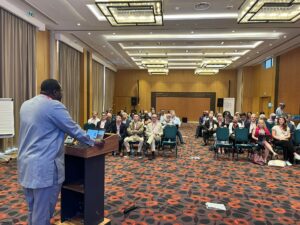
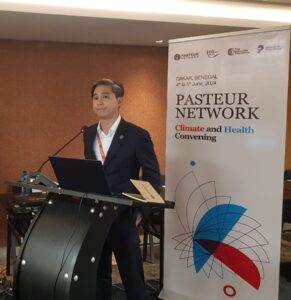
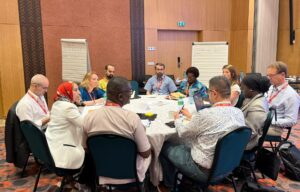
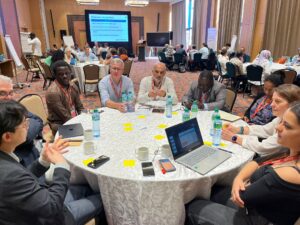
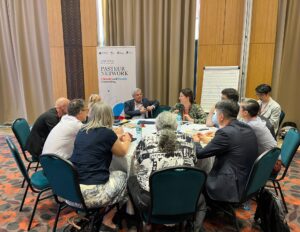
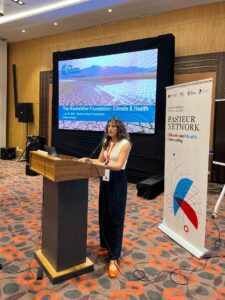
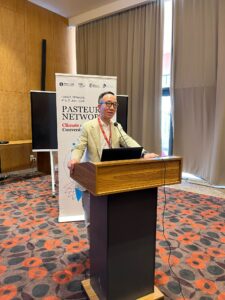
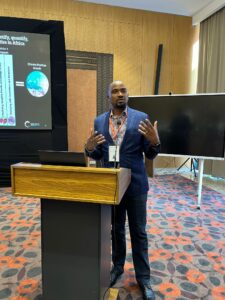
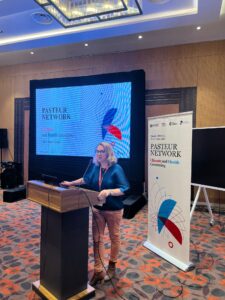
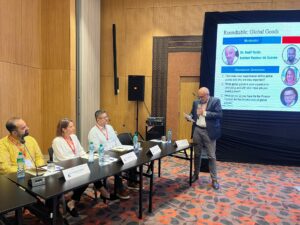
Following the January 2024 elections, the Pasteur Network welcomes the members of its new Board, comprising both newly elected and re-elected regional representatives alongside two externally nominated members.
The Board will steer the direction of our association over the next two years and is composed as follows:
President:
- Amadou A. Sall, Institut Pasteur de Dakar
Vice-President:
- Yasmine Belkaid, Institut Pasteur
Africa
- Amadou A. Sall, Institut Pasteur de Dakar (President)
- Noël Tordo, Institut Pasteur de Guinée
Americas
- Carlos Batthyány, Institut Pasteur de Montevideo
- Mario Moreira, Fondation Oswaldo Cruz (Fiocruz)
Asia-Pacific
- Leo Poon, HKU – Pasteur Research Pole
- Philippe Buchy, Institut Pasteur du Laos
Euro-Mediterranean
- Christian Léonard, Sciensano
- Abderrahmane Maaroufi, Institut Pasteur du Maroc
External Members:
- Isabella OYIER, KEMRI-Wellcome Trust.
- Linda VENCZEL, PATH.
To have more information about the governance, please visit the association’s governance page.
Six young graduates from the Pasteur Network were honored at the Institut Pasteur’s PhD graduation ceremony on December 8, 2023 in Paris.
This celebration marked the end of a chapter for this new generation of researchers and highlighted the excellence of the growing young scientific community trained at the Institut Pasteur, a Pasteur Network member.
This celebration, organized by the Institut Pasteur’s Education Department since 2013, marked its 11th anniversary, highlighting the scientific excellence of the Institut Pasteur’s young scientist community.
Chaired by Monica Sala, Director of the Education Department and Vincenzo di Bartolo, Head of the graduation ceremony organization team, this edition included an opening address by Valérie Masson-Delmotte, a climatologist, CEA Director of Research and Co-Chair of Working Group I of the Intergovernmental Panel on Climate Change (IPCC) as guest of honor.
She emphasized the intrinsic link between climate change and research, highlighting how the increase in temperature fosters the spread of vector-borne diseases. Hence, pursuing research is crucial in supporting the active response to this urgent matter.
The graduates were introduced by Monica Sala, Director of the Education Department at the Institut Pasteur in Paris and Rebecca Grais, Executive Director of the Pasteur Network. The doctoral students hailed from all four regions of the Pasteur Network – Africa, Americas, Asia-Pacific, Euro-Mediterranean – and had the opportunity to work on a wide variety of topics as detailed below. They all chose to share a quote that inspires them.
- Elliot Fara Nandrasana Rakotomanana

PhD in social and cultural anthropology, University of Bordeaux (France)
Institut Pasteur de Madagascar/Epidemiology and Clinical Research Unit
Thesis: Stunting and the risk of contamination by the living environment. An anthropology of early childhood through the prism of spatial and social organizations in a disadvantaged neighborhood in Antananarivo (Madagascar)
“Do not stop! With passion, courage and determination, we can overcome fear, sadness… progress and can break the barrier to success.”
Elliot Rakotomanana earned a postgraduate degree (DEA) in Biochemistry applied to nutrition from the University of Antananarivo (Madagascar) in 2006. He joined the Institut Pasteur de Madagascar (IPM) within the Epidemiology and Clinical Research Unit as national coordinator of a socio-anthropological study on stunting in 2014. Passionate about anthropology, in 2016 he embarked on studies in this discipline at the University of Bordeaux through the AFRIBIOTA project, a multidisciplinary research program within the Pasteur Network addressing pediatric environmental enteropathy and stunting. He completed a master’s degree in September 2017 and defended his doctoral thesis under the supervision of Prof. Marc-Eric Gruénais (Bordeaux University) and Dr. Tamara Giles-Vernick (Institut Pasteur) in January 2023. He reveals the broad processes underlying the resource-poor neighborhoods of Antananarivo and the inability of local inhabitants to manage waste, drawing on history, political science and geography. His approach is original; instead of asking why children are malnourished and experience stunting, he demonstrates why and how certain children can avoid it. Since 2018, he has been the deputy head of the “Health & Social Sciences” team at IPM.
- Amina Gihbid
Assistant professor at the High Institute of Nursing Professions and Health Techniques (ISPITS), Morocco & Associate member of the Oncovirology Laboratory, Institut Pasteur du Maroc
Thesis: Evaluation of viral, genetic and metabolic prognosis biomarkers for nasopharyngeal cancer
“That man can have nothing but what he strives for (39); That (the fruit of) his striving will soon come in sight (40); Then will he be rewarded with a reward complete (41).” Surat An-Najm (The Star), Quran

Amina Gihbid holds a PhD in Virology and Molecular Biology. Her research was conducted in the Oncovirology Laboratory at the Institut Pasteur du Maroc (IPM) and Faculty of Science Ain-Chock Casablanca – Morocco. It was mainly focused on the assessment and identification of potential viral, genetic and metabolic biomarkers that could predict early treatment outcomes in patients with nasopharyngeal carcinoma (NPC) and improve the prognosis of this particularly prevalent malignancy in Morocco. The findings of her research highlighted circulating Epstein-Barr virus (EBV) DNA viral load, along with metabolic parameters derived from [18F] FDG PET/CT scan as promising prognostic biomarkers in the clinical management of NPC. These biomarkers could therefore help to personalize patient treatment according to the risk of relapse and recurrence.
At IPM, she is currently working on two ongoing projects, one focusing on characterization of the epidemiological-genetic architecture of breast cancer in North Africa: therapeutic and socio-economic impact, and the second project pertaining to Personalized Medicine in North Africa (PerMediNA). She is also involved in studies conducted within IPM’s Oncovirology Laboratory, investigating the viral etiology of oropharyngeal carcinoma and breast cancer in Morocco.

Transversal activities in Applied Genomics at Sciensano, Belgium
Thesis: Exploring the added value of Whole Genome Sequencing in routine and pandemic viral surveillance
“The essence of a successful PhD lies in the ability to evolve and align research with an ever-changing world.”
Laura Van Poelvoorde earned her Master of Science in industrial engineering with a focus on biochemistry from the University of Ghent in 2017. Her interest in research and public health led her to the WIV-ISP (Scientific Institute of Public Health, now part of Sciensano) as a PhD researcher within the “Transversal Activities in Applied Genomics” department under the supervision of Nancy Roosens (Sciensano) and Xavier Saelens (Ghent University). Her PhD research focused on innovative strategies to improve the surveillance of influenza which led to exploring whole genome sequencing and analysis. This experience was extended to SARS-CoV-2 in wastewater surveillance. These studies led to a PhD in Biochemistry and Biotechnology in January 2023 and to 10 peer-reviewed publications on genomic strategies that contribute to improving respiratory virus surveillance for the benefit of society. After graduating, Laura Van Poelvoorde secured a permanent position at Sciensano focused on developing methods for pathogen detection in wastewater.
- Irini Thanou
Laboratory of Stem Cells and Neuroimaging / Neurobiology Department, Hellenic Pasteur Institute, Greece
Thesis: Exploring the Brain’s Response to Chemotherapy: Neurogenesis at the Forefront
“Ever tried. Ever failed. No matter. Try again. Fail again. Fail better,” S. Beckett

Irini Thanou’s academic journey in neurobiology has centered on understanding the intricate dynamics of adult neurogenic niches in both homeostasis and pathology. During her PhD research, she unveiled novel migratory routes of neural progenitors in response to chemotherapeutic agents, shedding light on the dynamic interplay of instinct and extrinsic cues regulating neurogenic regions and adjacent brain parenchyma. Exploring the brain’s regenerative capacity in response to pathology, she contributed to a published project using neurogenic microRNAs and small molecules for the direct reprogramming of astrocytes into functional neurons. The Institut Pasteur has played a pivotal role in shaping her research. Collaborative initiatives within the network allowed her to engage in projects investigating Alzheimer’s disease (AD) risk factors in brain homeostasis, providing valuable insights into the emerging role of neuroinflammation as a driving factor in AD. She also actively participated in a study on dynamic interactions between astrocytes and microglia during neuroinflammation, employing cutting-edge intravital brain imaging techniques. She aspires her next scientific chapter to be even more captivating.
- Beatriz Chaves

DTI-CNPq research fellow, Oswaldo Cruz Foundation (Fiocruz) – Laboratory on Thymus Research (LPT)
Thesis: Anti-VLA-4 antibodies for multiple sclerosis treatment: rational design and study of their mechanisms of action by high-content cell imaging
“Everything that challenges me makes me feel alive.”
Beatriz Chaves is a biotechnologist with experience in T-cell biology and antibody development. She has a bachelor’s degree in Biotechnology (UFC – Fortaleza, Brazil), a master’s degree in Cell and Molecular Biology (Fiocruz – Rio de Janeiro, Brazil) and a PhD in Biotechnology and Health/Computational and Systems Biology (Fiocruz/INFINITy-INSERM – Eusébio/Rio de Janeiro/Toulouse, Brazil/France). During her academic journey, she worked on the in silico design, production and functional evaluation of antibodies targeting Very Late Antigen 4 (VLA-4) for Multiple Sclerosis (MS) treatment. Throughout her PhD, she investigated the morphological profiling of MS patients’ lymphocytes by high-content cell imaging to determine their clinical response to the current antibody-based anti-VLA-4 therapy. The research, collaborations and scientific skills developed by Beatriz in her academic career have so far resulted in one patent; five published, one accepted and two ongoing papers; and three awards won at conferences. Beatriz’s current research goals include gaining a better understanding of the role of T-cells in MS pathogenesis and improving current immunotherapies for chronic diseases.
- Noé Ochida
Institut Pasteur de Nouvelle-Calédonie
Institut Pasteur Paris, Mathematical Modeling of Infectious Diseases Unit
Thesis: Modeling the dynamics of COVID-19, dengue, and the establishment of Wolbachia in Aedes aegypti populations in New Caledonia / Theme: Infectious diseases modeling
“A great adventure with quite a few twists along the way and many joys”
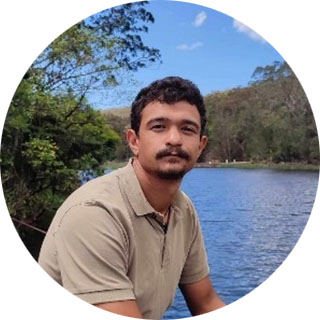
Noé Ochida from New Caledonia graduated from Montpellier University with a bachelor’s degree in microbiology. For his master’s degree, he shifted from the microscopic scale to study the ecology of infectious diseases. Recognizing the impact of dengue in New Caledonia, he pursued an M2 internship at the Institut Pasteur de Nouvelle-Calédonie (IPNC) to work on a public health issue in his homeland. This opportunity led him to a PhD at IPNC in collaboration with the IRD on modeling dengue dynamics and the establishment of Wolbachia in Aedes aegypti populations in New Caledonia. His research focused on present and future climate risk of dengue outbreaks in New Caledonia using downscaled climate projections of global climate models. He also modeled Wolbachia strategy deployment in Nouméa, suggesting optimal release strategies and assessing its impact on dengue transmission. He had the opportunity to provide modeling support to decision makers during the COVID-19 crisis in New Caledonia. He is currently in a postdoctoral research role at the Mathematical Modeling of Infectious Diseases Unit led by Prof. Simon Cauchemez at the Institut Pasteur in Paris.
Dubai, United Arab Emirates – Climate change threatens to reverse decades of global development progress and puts the health and livelihoods of future generations in jeopardy. Data indicates a rapid increase in temperature, humidity and rainfall which negatively impacts health, agriculture and vulnerable populations including women. For example, increasing temperatures and rainfall from El Nino support growth of mosquitoes in new locations which previously did not support mosquito populations resulting in spread of diseases such as malaria and dengue fever. There is an urgent need to invest in creative solutions that adapt and build resilience to these existing and future climate related challenges.
The Global Grand Challenges network of partners are pleased to announce a joint funding call of approximately USD 12M. This funding is aimed to support innovators addressing the critical intersection of climate change, health, agriculture, and gender. The partners include Science for Africa Foundation-Grand Challenges Africa; Grand Challenges Rwanda; Grand Challenges Brazil; Grand Challenges Ethiopia; and Grand Challenges India in partnership with Bill and Melinda Gates Foundation, Wellcome, Foundation S-The Sanofi Collective S, Rockefeller Foundation and Pasteur Network. This funding follows a 2022 climate and health call for applications by Grand Challenges Canada and the South African Medical Research Council-Grand Challenges South Africa.
“Climate change is one of the greatest global health challenges of our time. To help solve it, we need science to understand and address the climate and health crisis, especially to support actions that benefit and protect the most affected people and communities. By bringing different funders together under the common umbrella of the Grand Challenges partnership, we can ensure that promising scientific solutions to climate change are supported and delivered to achieve impact at scale,” said Alan Dangour, Director Climate and Health, Wellcome
We seek innovative projects utilizing transdisciplinary approaches to better adapt to, mitigate, or reverse the combined, deleterious effects of climate change on health, women’s lives, and agriculture. Preference will be given to innovations that are formulated locally or adapted from other contexts. We are especially interested in cross-cutting solutions at the intersection of multiple scientific and engineering disciplines and locally led, system-level innovations that are scalable and sustainable. This request for proposals by Grand Challenges partners will provide innovators with seed grants of up to USD 200,000 each for a period of 24 months to execute their visionary projects.
Announcing the request for proposals today on behalf of all Grand Challenges partners at COP28 session on Climate-Health Solutions Showcase’ in Dubai, United Arab Emirates (UAE), the Science for Africa Foundation, home of Grand Challenges Africa, CEO, Tom Kariuki said: “the people whose health and wellbeing are being harmed first and worst by the climate crisis are also the ones who contribute least to its causes, and who are least able to protect themselves and their families against it—namely people in low-income and disadvantaged countries and communities. In low-income settings, rising heat, extreme weather events, changes in precipitation patterns, shifts in duration and prevalence of climate-sensitive diseases (malaria, dengue, many foodborne and water-borne diseases), and increased potential for the emergence of novel diseases damage already weak primary health care systems and community health structures. Together with our partners, we are committed to fostering collaborative efforts to catalyse innovations that will safeguard the well-being of our communities and pave the way for a more sustainable, resilient future.”
“Grand Challenges India is keen to attract proposals that build resilient systems to mitigate climate change impact on agriculture and human health. Solutions may include responsive adaptation mechanisms, accurate surveillance and monitoring systems, predictive models, early detection of vector-borne, waterborne diseases, and infectious pathogens of concern. Strengthening research capacities, developing smart healthcare, integrating crop-livestock system to enhance agroecosystem resilience, soil health and biodiversity are some of the focus areas. The call would encourage research and innovation utilizing transdisciplinary approaches to better adapt and mitigate or reverse the combined, deleterious effects of climate change impact on agriculture and health in India.” said Shirshendu Mukherjee, Mission Director, Grand Challenges India.
“Foundation S is pleased to support this public-private effort to strengthen community resilience to the impacts of climate change on health. Outputs of this work will help facilitate the much-needed evidence and data required to support innovative approaches for climate adaptation at the local level,” said Vanina Laurent-Ledru Director General, Foundation S.
“Continuing to make progress against diseases like malaria means addressing climate, health and development in a complementary way,” said Kedest Tesfagiorgis, Deputy Director of Global Partnerships & Grand Challenges at the Bill & Melinda Gates Foundation. “I’m excited to see the global network of Grand Challenges partners, including the seven partners from five continents supporting this call, contributing the diversity of expertise and perspective needed to foster cutting-edge, locally relevant innovation in communities around the world.”
The funding represents a pivotal step towards addressing climate change contributing to a healthier, more resilient future. Proposals should address the following critical areas:
- Climate & health outcomes; including gender related impact
- Climate and nutrition
- Adaptation strategies for agriculture and income development, with a focus on women’s agriculture livelihoods.
- Knowledge management and data integration of climate and health databases
- Effective response and resilient supply chains for crisis management
To read more and apply for this request for proposals please visit : https://gcgh.grandchallenges.org/grant-opportunities
About the Global Grand Challenges Network of Partners
The global grand challenges network of partners support innovative solutions to “Grand Challenges” in health and development with a vision for a world where local, regional, and global innovation ecosystems are thriving and fostering solutions in the places where they will have the most impact. Together, Grand Challenges (GC) partners have invested US$1.6 billion, awarding 3,800 grants to a diverse pool of scientists and researchers in 118 countries. These include various GCs and their host institutions below:
- Grand Challenges Africa, Science for Africa Foundation
- Grand Challenges Canada, Government of Canada
- Grand Challenges South Africa, South African Medical Research Council (SAMRC)
- Grand Challenges Rwanda, Rwanda’s National Council of Science and Technology (NCST)
- Grand Challenges Brazil, Brazil’s Ministry of Health
- Grand Challenges Ethiopia, Ethiopia’s Ministry of Health and hosted at Armauer Hansen Research Institute (AHRI)
- Grand Challenges India, India’s government, Biotechnology Industry Research Assistant Council (BIRAC)
In addition to national government funding, these GCs are also supported by the Bill & Melinda Gates Foundation, Wellcome, Foundation S -Sanofi Collective, Rockefeller Foundation and Pasteur Network.
Media Enquiries:
Juliette Mutheu, Corporate & Science Communications
j.mutheu@scienceforafrica.foundation
During the Opening Ceremony of the Pasteur Network Annual Meeting 2023 on November 19th in Tunis, Dr. Ngu Abanda, a scientist from the Centre Pasteur in Cameroon received the Pasteur Network Talent Award 2023 from Stewart Cole, President of the Pasteur Network Foundation and President of the Institut Pasteur. The Talent Awards support the career development of young scientists to become future leaders within the Pasteur Network.
Dr Ngu Abanda obtained his Ph.D. in Tropical Medicine from the University of Hawaii in 2017. During his Ph.D. studies, he conducted research on factors contributing to poor treatment outcomes among Tuberculosis patients, especially children. He also evaluated the accuracy of new rapid molecular-based assays for the diagnosis of drug-resistant Tuberculosis.
Later on, Dr Ngu Abanda, to broaden his knowledge on the clinical diagnosis of infectious diseases, took up the position of microbiologist at the Public Health Laboratory of the Texas Department of State Health Services (USA). He contributed to set up a new molecular assay to detect Candida auris, an emerging fungal pathogen that is associated with nosocomial infections and considered a serious global health threat. During this postdoctoral period, he acquired solid experience in clinical diagnosis of infectious diseases. He joined the Pasteur Center in Cameroon (CPC) in 2020, first as a temporary laboratory scientist with primary activity to lead a team working 24 hours/7 days on COVID-19 diagnosis.
“Dr Ngu Abanda made a significant contribution to CPC’s COVID-19 diagnostic activities and became a research scientist at CPC with primary mission to develop arbovirus research activities. He now leads the WHO yellow fever regional reference laboratory (RRL) and the arbovirology laboratory at CPC” explained Mirdad Kazanji, Director of the Centre Pasteur in Cameroun.
His current research activities focus on the long-term immunity of the yellow fever vaccine, and the epidemiological and entomological surveillance of arboviruses.
”Providing affordable and quality assured diagnosis to inform vector-borne diseases control and prevention programs is the central tenet of our activities.” Dr Ngu Abanda
His long-term goal is to develop a comprehensive and multidisciplinary research and training program on arboviruses thanks to its daily investment alongside the CPC teams.
“Eleven brilliant young scientists of the Pasteur Network have already received this prize and are still contributing in an excellent way to the scientific excellence of the Pasteur Network. Today, we are honored to reward the quality of the first achievements made by Dr Ngu Abanda and to support his career and its further ambitious developments” underlined Stewart Cole, President of the Pasteur Network Foundation and President of the Institut Pasteur.
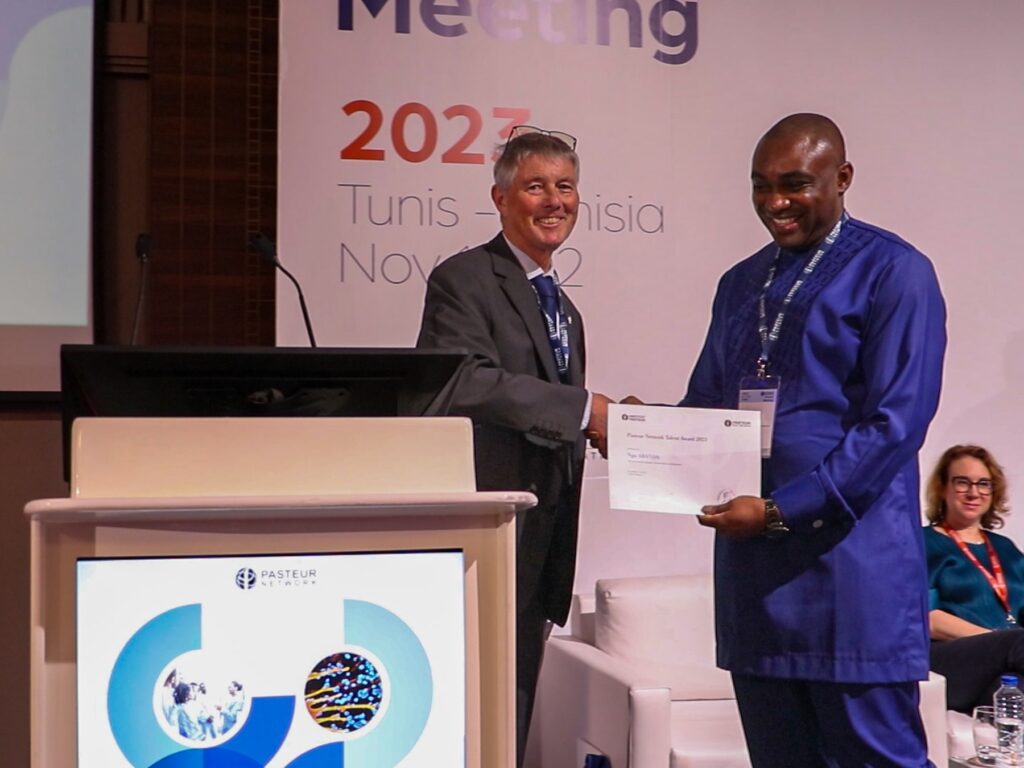
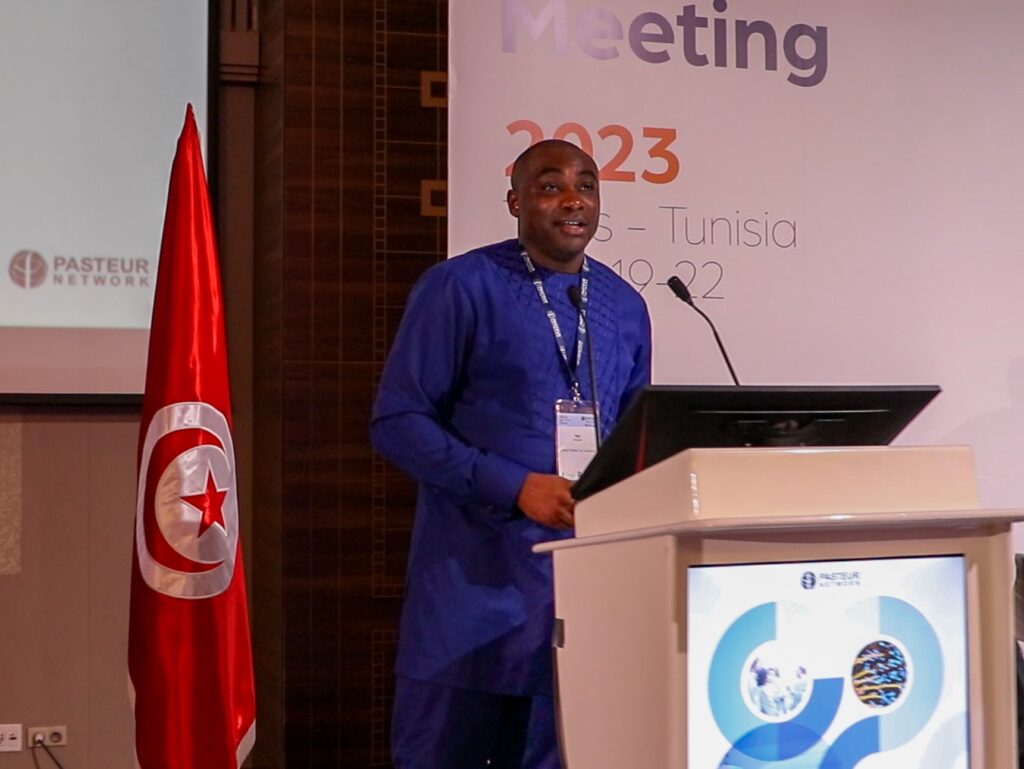
The Pasteur Network Annual Meeting 2023 (PNAM), co-organized with the Institut Pasteur de Tunis (IPT) will take place from 19 to 21 November 2023 at the Laico Hotel and Conference Center in Tunis, Tunisia. The PNAM gathers professionals from all Pasteur Network members, scientific institutions, public health institutions, multilateral organizations, civil society organizations and charitable foundations focusing on science and public health.
The meeting will focus on global thematic priorities including climate sensitive emerging infectious diseases, the R&D and innovation ecosystem, epidemic intelligence, AMR, and mother and child health.
The opening ceremony will take place on Sunday 19 November starting at 6 pm (UTC+1) chaired by Hechmi Louzir, former Director General of IPT, and will include opening remarks by the recently appointed Director General of IPT, Samia Menif. Amadou Sall, President of the Pasteur Network & CEO of the Institut Pasteur de Dakar, Stewart Cole, President of the Pasteur Network Foundation & President of the Institut Pasteur, Rebecca Grais, Executive Director of the Pasteur Network, Ali M’rabet, Minister of Health of Tunisia will also provide remarks. Furthermore, presentations will be delivered on “Tuberculosis – the forgotten pandemic” by Stewart Cole and “Arabic medicine & Arabic civilization” by Dr. Rafik Boukhris.
Follow the Live Streaming
Available for the Opening Ceremony on YouTube channels
After a series of roundtables and presentations, participants will be able to engage in solution sessions on Pasteur Network strategic axes: (1) reinforcing epidemic intelligence and preparedness with a specific focus on climate sensitivity; (2) supporting the research, development, and innovation ecosystem in critical diagnostics, vaccines, and therapeutics; (3) creating multi-disciplinary knowledge communities; and (4) equitable collaboration, and sustainability.
This year, the meeting will also provide a platform for young scientists from all the regions of the Pasteur Network to present their research focused on the key thematic areas.
A visit to the Institut Pasteur de Tunis and a cultural tour are also included in the programme.
The PNAM 2023 is funded by the Pasteur Network, the Institut Pasteur de Tunis, and Wellcome.
About the Institut Pasteur de Tunis
The Institut Pasteur de Tunis (IPT) is a public health institution under the authority of the Ministry of Health of Tunisia. Its mission is to carry out epidemiological and clinical studies, biomedical investigations, as well as research activities pertaining to human and animal health. IPT also manufactures vaccines and sera for the needs of the country. Affiliated to the Université de Tunis El Manar, the institute contributes to higher education at both the national and regional levels.
The Institut Pasteur de Tunis is internationally recognized and collaborates with foreign scientific institutions.
Since its creation, in 1893 (the third Institut Pasteur after Paris and Hô-Chi-Minh-Ville), the institute has focused its research activities on infectious diseases of viral, bacterial and parasitological origin, including zoonotic and vector-borne diseases. It is also conducting research on snake envenoming, immune deficiencies, hemoglobinopathies and genetic diseases
Finally, IPT is also active in research projects involving several members of the Pasteur Network in Africa and Europe like REPAIR, PerMediNA, Atun-Dips, and Alliance SHS Afrique. For more information, visit the Institut Pasteur de Tunis’s official website.
Press contact: Hichem Ben Hassine / hichem.benhassine@pasteur.tn
About the Pasteur Network
The Pasteur Network is a vast human and scientific community with more than 30 members in over 20 countries contributing together to global health. Located in the heart of endemic areas, the Network has privileged access to a large number of pathogens that it monitors and studies on all five continents. This exceptional diversity makes the Pasteur Network a unique global actor in public health, science, innovation, and education, especially in the fight against infectious diseases.
Presse : Juliette Hardy / cominter@pasteur.fr